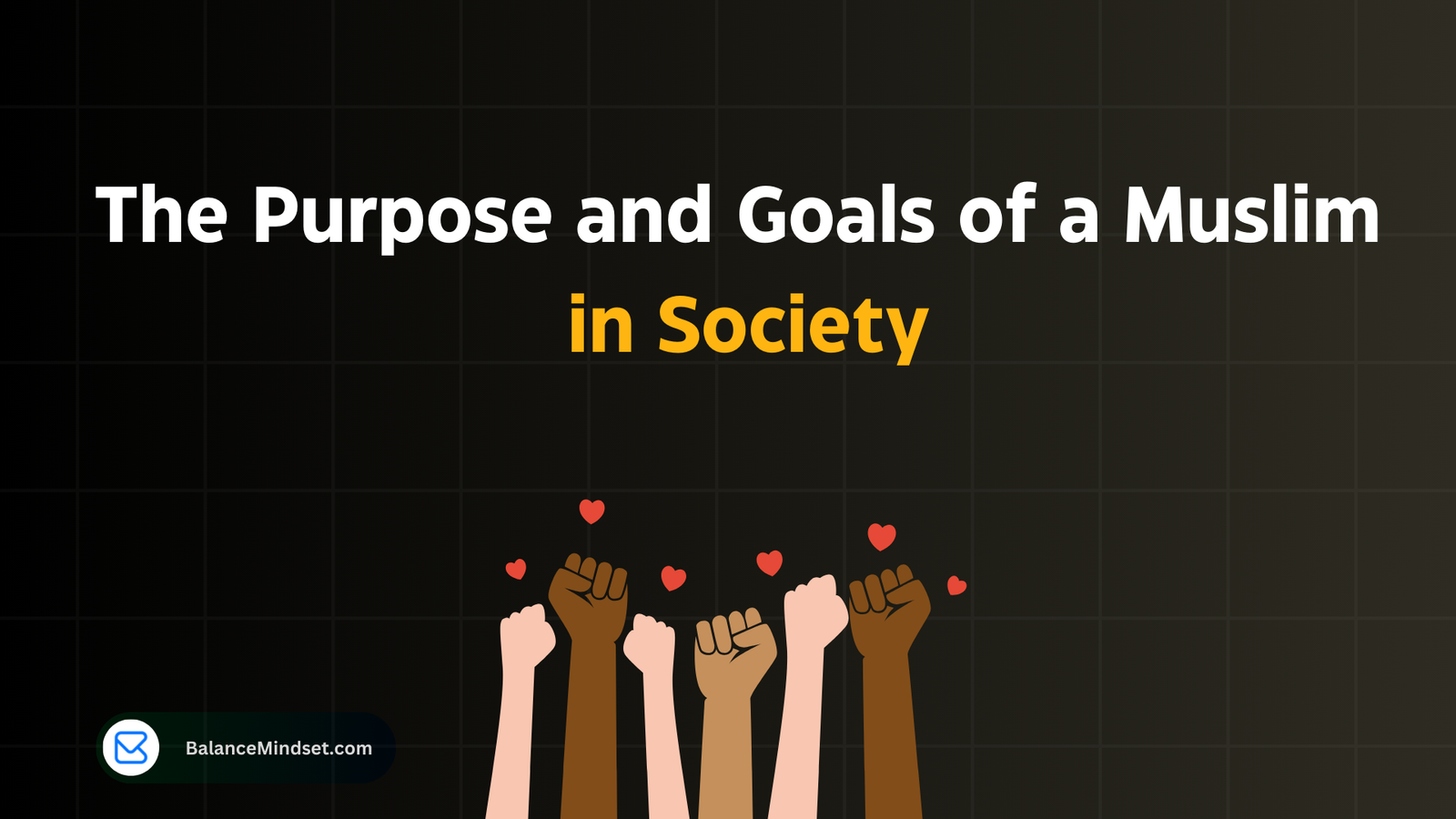In Islam, the purpose and goals of a Muslim in society are clearly defined by the teachings of the Quran and Sunnah. These guidelines shape a Muslim’s behavior, values, and actions in a way that not only benefits the individual but also contributes to the betterment of society. As a Muslim, it is essential to understand your responsibilities and the role you play in making a positive impact on the world.
Table of Contents
Understanding Your Purpose as a Muslim
The primary purpose of a Muslim, according to the Quran, is to worship Allah and seek His pleasure. Allah says in the Quran:
- “I did not create the jinn and humans except to worship Me.” (Quran 51:56)
Worship in Islam isn’t limited to rituals like prayer and fasting; it encompasses every aspect of life, from how we treat others to how we fulfill our duties in society. Following the Quran and Sunnah, Muslims are encouraged to lead a life of purpose, contributing to the community, helping the less fortunate, and upholding justice.
Goals of a Muslim in Society
A Muslim’s goals in society should align with the values and principles laid out in the Quran and Sunnah. These goals include:
1. Promoting Good and Forbidding Evil (Amr bil Ma’ruf wa Nahi anil Munkar)
One of the key responsibilities of a Muslim is to encourage what is good and discourage what is evil. The Quran says:
- “You are the best nation produced [as an example] for mankind. You enjoin what is right and forbid what is wrong.” (Quran 3:110)
This means that as a Muslim, you should promote ethical behavior and guide people toward good deeds while helping them avoid harmful actions. Whether it’s in the workplace, within your family, or in the wider community, setting a good example is an important goal for every Muslim.
2. Establishing Justice
Justice is a fundamental part of Islamic teachings. The Quran emphasizes that Muslims should always be fair and just, regardless of the situation:
- “Indeed, Allah commands you to render trusts to whom they are due and when you judge between people, to judge with justice.” (Quran 4:58)
In society, Muslims are expected to uphold justice in all dealings, whether it’s in business, family matters, or social interactions. Fairness and equity are vital for building a strong, moral society.
3. Serving Humanity
Islam teaches compassion and mercy for all of creation. One of the major goals of a Muslim is to serve humanity by helping those in need. The Prophet Muhammad (peace be upon him) said:
- “The best among you are those who bring the most benefit to others.” (Hadith, Sahih)
This means that Muslims should actively seek out opportunities to support others, whether by giving charity, offering advice, or simply being kind. In addition, Muslims should strive to improve the welfare of society through both personal and collective efforts.
4. Maintaining Family and Social Relations
Islam places great importance on the family unit and social relationships. Muslims are encouraged to maintain good relations with their parents, spouses, children, and neighbors. The Quran states:
- “And your Lord has decreed that you not worship except Him, and to parents, good treatment.” (Quran 17:23)
By following the Quran and Sunnah, Muslims should aim to build strong family bonds and foster a sense of community in society. Respecting others, offering support, and creating harmony are essential for a peaceful and productive society.
5. Pursuing Knowledge
In Islam, seeking knowledge is highly encouraged. The Prophet Muhammad (peace be upon him) said:
- “Seeking knowledge is an obligation upon every Muslim.” (Hadith, Sunan Ibn Majah)
Education is not only about religious knowledge but also about worldly sciences. Muslims are encouraged to pursue knowledge that will benefit both themselves and society. By becoming knowledgeable, Muslims can contribute to the development and progress of the community.
6. Calling People to Islam (Dawah)
Dawah, or inviting others to Islam, is another significant goal for Muslims in society. Sharing the peaceful and just message of Islam with others is an important aspect of fulfilling your role as a Muslim. The Quran says:
- “Invite to the way of your Lord with wisdom and good instruction, and argue with them in a way that is best.” (Quran 16:125)
This means engaging in conversations with non-Muslims in a kind, respectful manner, explaining the values of Islam, and showing them the beauty of the faith through actions.
7. Maintaining Personal Integrity and Morality
A Muslim must always strive to uphold personal integrity and morality. Following the Quran and Sunnah, a Muslim should be honest, truthful, and kind. Every action, whether small or large, reflects a Muslim’s commitment to live in accordance with Allah’s commands.
Conclusion
In summary, the goals of a Muslim in society are far-reaching and impactful. By following the Quran and Sunnah, a Muslim can lead a life that not only pleases Allah but also benefits humanity. Promoting good, serving others, upholding justice, and fostering knowledge are just a few of the important objectives that every Muslim should strive to achieve. These goals help create a peaceful, just, and compassionate society where everyone can thrive.
By focusing on these key purposes, a Muslim ensures that their life is meaningful, productive, and in alignment with the teachings of Islam.


